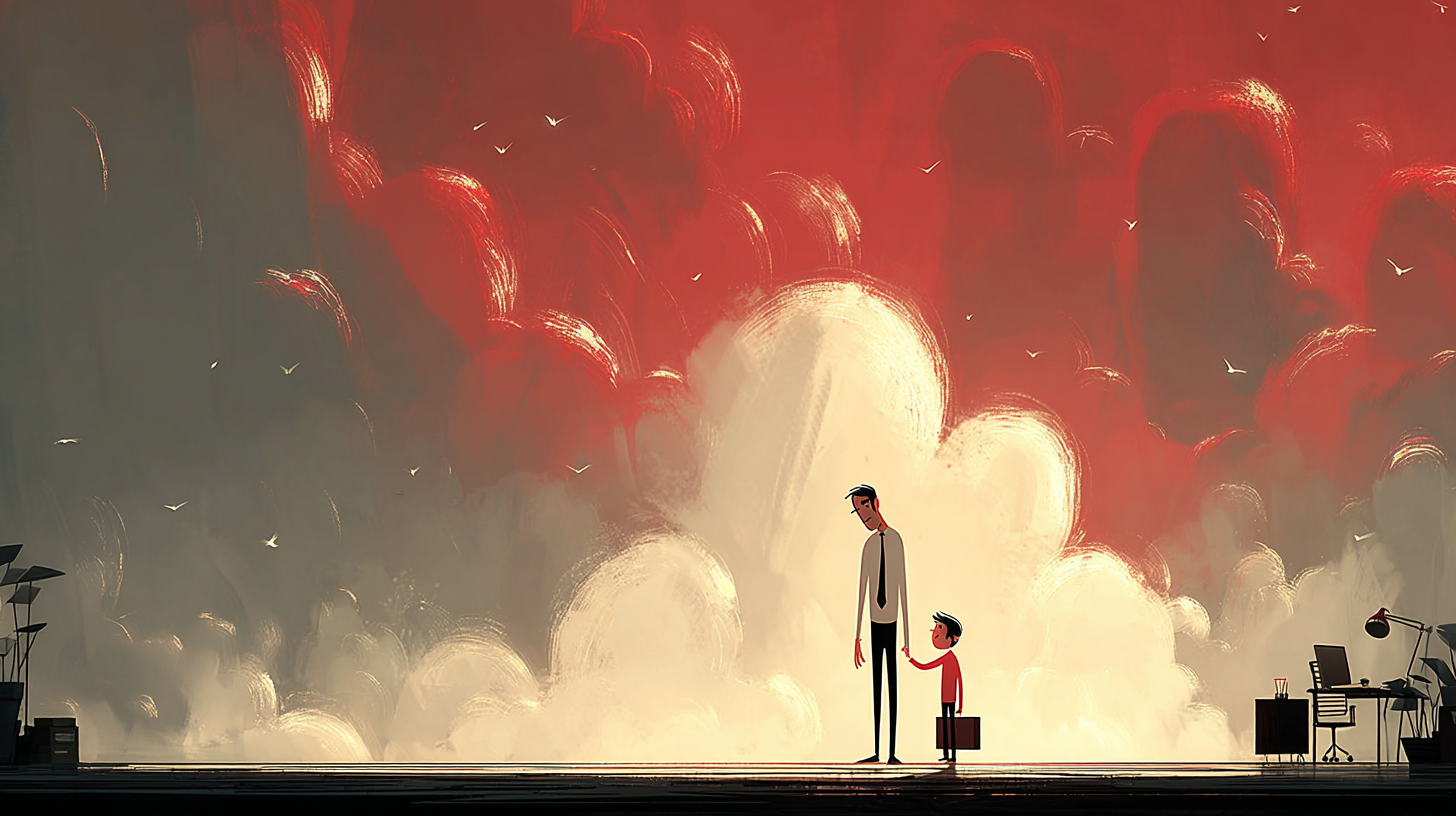“Depression” means feeling very sad, a time when the economy is very bad, or a low place in the ground.
「depression」は心がとても落ちこんでいる状態や、経済が悪い時、また地面のへこんでいる場所を意味します。
以下は英単語 “” に関するストーリー型学習コンテンツです。まずは大枠の意味を理解して最後の文章で確認しましょう。
主な意味(main meaning)
| 品詞 | 発音記号 | 意味 | 英語例文 |
|---|---|---|---|
| 名詞 (noun) | /dɪˈprɛʃən/ | 強いうつ状態、悲しみ | She has been suffering from depression for several months. |
| 名詞 (noun) | /dɪˈprɛʃən/ | 景気の不況 | The country faced a severe economic depression. |
| 名詞 (noun) | /dɪˈprɛʃən/ | 低地、へこみ | There was a small depression in the ground after the heavy rain. |
語源(etymology)
ラテン語 deprimere (押し下げる)が語源。
「下に押す」イメージから、「気分を押し下げる=うつ」、「景気を押し下げる=不況」、「地面が押し下げられる=へこみ」と発展。
類義語(synonyms)
| 類義語 | 意味 | 例文 |
|---|---|---|
| sadness | 悲しみ | His eyes were full of sadness when he said goodbye. |
| despair | 絶望 | She was in despair after losing her job. |
| recession | 景気後退 | The company closed during the recession. |
| slump | 不況、急落 | The team went into a long losing slump. |
| melancholy | 憂うつ | He felt a sense of melancholy on rainy days. |
反義語(antonyms)
| 反義語 | 意味 | 例文 |
|---|---|---|
| happiness | 幸せ | Traveling with friends brought her great happiness. |
| prosperity | 繁栄 | The city enjoyed years of prosperity after the new factory opened. |
コロケーション(collocations)
| コロケーション | 例文 |
|---|---|
| suffer from depression | Many people silently suffer from depression. |
| economic depression | The country faced an economic depression in the 1930s. |
| deep depression | He fell into a deep depression after the accident. |
| fight depression | Exercise can help people fight depression. |
| fall into depression | After losing her husband, she fell into depression. |
2項表現(binomials)
| 表現 | 例文 |
|---|---|
| rise and fall | The rise and fall of the company surprised everyone. |
| ups and downs | Life is full of ups and downs. |
英語ストーリー(english story)
A Workplace Story about Depression
Tom worked at a small marketing company in the city. He was usually cheerful and enjoyed spending time with his colleagues. However, after the company faced an economic depression, many projects were canceled. The office atmosphere changed. Everyone worried about job security, and Tom started to feel heavy pressure.
At first, he tried to stay positive, but slowly he began to suffer from depression. He felt sadness every morning when he woke up, and sometimes he even thought about quitting his job. His best friend at work, Sarah, noticed his change. She said, “Tom, I know life has many ups and downs, but you don’t have to face this alone.”
Tom confessed that he had fallen into a deep depression. Sarah listened carefully and encouraged him to see a counselor. She also invited him to join her in jogging every weekend. “Exercise can help you fight depression,” she explained.
Meanwhile, the company was still struggling. The rise and fall of sales made the manager nervous. The team often discussed how to overcome the slump. Even though the situation was difficult, Sarah kept reminding Tom that hard times do not last forever.
With time, Tom started to recover. He followed Sarah’s advice and saw a counselor. Talking about his feelings helped him. Exercise also gave him new energy. Slowly, the sadness and melancholy began to disappear.
One day, the manager announced that the company had found new clients and things were finally improving. Everyone felt relief. Tom realized that, just like the economy can move from recession to prosperity, his own feelings could also change.
He thanked Sarah, saying, “Without your support, I might still be in despair. Now I believe that even after depression, happiness can return.”
和訳
トムは都会の小さなマーケティング会社で働いていました。彼は普段は明るく、同僚と過ごすのを楽しんでいました。しかし、会社が**economic depression(経済の不況)**に直面すると、多くのプロジェクトが中止になりました。オフィスの雰囲気は変わり、皆が仕事の安定を心配しました。トムは大きなプレッシャーを感じ始めました。
最初は前向きにしようとしましたが、次第に**depression(うつ)に苦しむようになりました。朝起きると悲しさに包まれ、仕事を辞めたいとさえ思いました。職場の親友サラは彼の変化に気づきました。「トム、人生にはups and downs(浮き沈み)**があるけれど、一人で背負う必要はないわ。」
トムは自分が**deep depression(深いうつ状態)に落ちていることを打ち明けました。サラは真剣に耳を傾け、カウンセラーに相談するよう励ましました。さらに、毎週末のジョギングに誘いました。「運動はfight depression(うつに立ち向かう)**助けになるのよ。」
その間も会社は苦しんでいました。売り上げの**rise and fall(浮き沈み)にマネージャーは不安を感じていました。チームはどうやってslump(不況・低迷)**を克服するか話し合いました。それでもサラは「困難は永遠には続かない」とトムに言い続けました。
やがてトムは回復し始めました。カウンセラーに相談し、自分の気持ちを話すことで助けを得ました。運動も彼に新しいエネルギーを与えました。少しずつ悲しみや**melancholy(憂うつ)**は消えていきました。
ある日、マネージャーが新しい顧客を獲得し、会社の状況が改善してきたと発表しました。皆が安心しました。トムは、経済が**recession(不況)からprosperity(繁栄)**に変わるように、自分の気持ちも変わることができると気づきました。
彼はサラに「君の支えがなければ、まだ**despair(絶望)の中にいたかもしれない。でも今は、うつの後にhappiness(幸せ)**が戻ってくると信じられる」と感謝しました。
Q&A
Q: 「depression」と「sadness」の違いは?
A: 「sadness」は一時的な悲しみを表します。例えば、試験に落ちた時や映画を見て泣いた時の感情です。
一方「depression」はもっと深く長く続く気分の落ち込みで、医学的に「うつ病」とも結びつくことがあります。
Q: 「depression」と「despair」の違いは?
A: 「despair」は「絶望」で、希望を完全に失っている状態を指します。
「depression」は悲しみや無気力が続く状態ですが、必ずしも「希望を全て失った」意味ではありません。
Q: 「depression」と「recession」の違いは?
A: 両方とも経済に関する言葉ですが、程度が違います。
「recession」は景気が後退している状態を指し、軽い不況も含みます。
「depression」はもっと深刻で長期的な不況を指すことが多いです。
Q: 「depression」と「slump」の違いは?
A: 「slump」は一時的な低迷を表し、経済だけでなくスポーツや学業にも使えます(例:バッターの打撃スランプ)。
「depression」は経済なら大規模で深刻な不況、心理なら長く続く深い落ち込みを意味します。
Q: 「depression」と「melancholy」の違いは?
A: 「melancholy」は理由がはっきりしない静かな憂うつ感を表します。文学的で感傷的な響きがあります。
「depression」は医学的・社会的にも使われる、より深刻で実際的な「落ち込み」を意味します。
Q: 「depression」と「happiness」の違いは?
A: 「happiness」は喜びや満足など前向きな気持ちを表します。
「depression」はその反対で、落ち込みや悲しみの感情を表します。
Q: 「economic depression」と「recession」の違いは?
A: 「economic depression」は歴史的に大きな不況を指すことが多く、「大恐慌(Great Depression)」のように使われます。
「recession」はより一般的で、景気の落ち込みを幅広く指します。
Q: 「fight depression」と「suffer from depression」の違いは?
A: 「suffer from depression」は「うつに苦しんでいる」という状態を表します。
「fight depression」は「うつと戦う」「克服しようと努力する」前向きな行動を表します。
Q: 「fall into depression」と「deep depression」の違いは?
A: 「fall into depression」は「うつの状態に入ってしまう」という変化を表します。
「deep depression」は「非常に重いうつ状態」にあることを表します。
Q: 「rise and fall」と「ups and downs」の違いは?
A: 両方とも「浮き沈み」を表しますが、
「rise and fall」は経済や組織の盛衰のような大きな流れを指します。
「ups and downs」は日常生活や気分の変化のような小さな浮き沈みを表します。



コメント